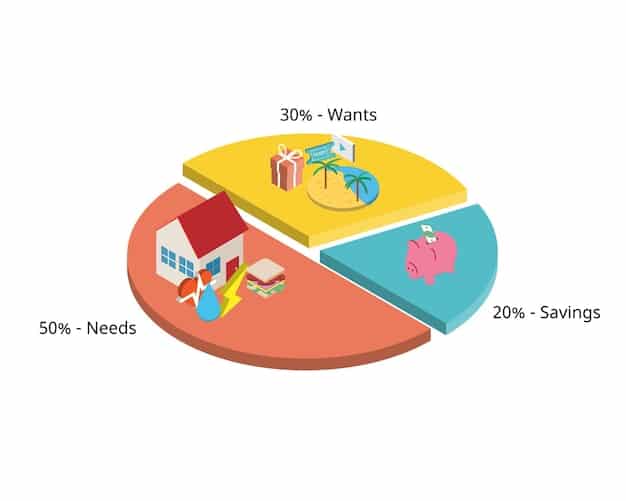Zero-Based Budgeting in 2025: Master Your Finances Now

Navigating personal finance in 2025 requires a strategic approach, and Zero-Based Budgeting in 2025: A Step-by-Step Guide to Taking Control of Your Finances offers a proven methodology to assign every dollar a purpose, ensuring financial clarity and empowering individuals to achieve their monetary goals with precision.
In an ever-evolving economic landscape, taking firm control of your finances is more crucial than ever. This guide, focusing on Zero-Based Budgeting in 2025: A Step-by-Step Guide to Taking Control of Your Finances, aims to demystify one of the most effective budgeting strategies available. It’s about empowering you to make every dollar count, transforming your financial outlook from reactive to proactive and setting a robust foundation for your future financial well-being.
The Philosophy Behind Zero-Based Budgeting
Zero-Based Budgeting (ZBB) is a financial strategy where every dollar of income is allocated a specific purpose, be it an expense, saving, or debt repayment. Unlike traditional budgeting, which often starts with the previous period’s actual spending and adjusts from there, ZBB begins from scratch each month. This innovative approach demands that all expenses are justified for each new period, effectively bringing your available balance to zero. It’s a powerful shift in perspective, forcing a conscious decision on the utility and necessity of every financial outflow.
This methodology compels individuals to ask critical questions about their spending habits, fostering a deeper understanding of where their money truly goes. By starting with a clean slate monthly, ZBB inherently promotes adaptability. It allows for a dynamic response to changes in income or expenses, a vital characteristic in the fluctuating financial environment of 2025. The core principle isn’t about deprivation, but rather about intentional allocation, ensuring that your financial resources align with your most important goals and values.
Understanding the “Zero” Concept
The “zero” in zero-based budgeting doesn’t mean having no money left in your account at the end of the month. Instead, it signifies that your income minus your expenses, savings, and debt payments should equal zero. Every single dollar has a job, eliminating idle funds and maximizing your financial efficiency. This proactive assignment of funds prevents money from being spent haphazardly or “disappearing” without a clear purpose.
This intentionality transforms budgeting from a restrictive chore into a strategic tool. You are not just tracking spending; you are dictating it. This level of control empowers individuals to direct their money towards what truly matters, whether that’s saving for a down payment, investing in education, or paying off high-interest debt. It’s an active process that ensures alignment between your financial behavior and your long-term aspirations.
Preparing for Your Zero-Based Budget Journey
Before diving into the specifics of Zero-Based Budgeting (ZBB), a foundational preparation phase is essential. This initial groundwork sets the stage for a successful and less stressful budgeting experience. It involves gathering crucial financial information, understanding your current financial standing, and mentally committing to the process. Without these preliminary steps, the complexities of ZBB can quickly become overwhelming, hindering your progress before it even begins.
Starting this preparation early allows for a smoother transition to the ZBB methodology. It’s an opportunity to reflect on past financial behaviors and identify patterns that you either want to continue or change. This introspection is a vital part of the journey, ensuring that your budget reflects not just your financial reality but also your financial aspirations. Taking the time for this preparation is an investment in your financial future, promising greater clarity and control.
Gathering Financial Data
The first concrete step is to meticulously collect all relevant financial documents. This includes bank statements, pay stubs, credit card statements, loan agreements, and any other records of income and expenditure. Having a clear, comprehensive picture of your financial inflows and outflows is non-negotiable. This meticulous data collection supports the “zero” principle by ensuring every dollar can be accounted for.
* Income Sources: Document all forms of income, including your regular salary, freelance earnings, dividends, or any other money coming in.
* Fixed Expenses: List all expenses that remain consistent each month, such as rent/mortgage, loan payments, and insurance premiums.
* Variable Expenses: Compile a list of expenses that fluctuate, like groceries, utilities, entertainment, and transportation.
* Debt Overview: Detail all outstanding debts, including interest rates and minimum payments.
Setting Clear Financial Goals for 2025
Defining clear, measurable financial goals is the compass that guides your ZBB. Without specific objectives, a budget can feel directionless. Do you want to save for a down payment, pay off a significant debt, or invest for retirement? These goals will directly influence how you allocate your funds. Make them SMART: Specific, Measurable, Achievable, Relevant, and Time-bound.
This goal-setting exercise isn’t just about identifying what you want; it’s about prioritizing. Given that ZBB assigns every dollar a purpose, understanding your priorities ensures that your money is flowing towards what truly matters to you. It’s a proactive step that moves your financial planning beyond mere expense tracking into the realm of strategic wealth building.
Step-by-Step Implementation of Zero-Based Budgeting
Implementing Zero-Based Budgeting can seem daunting at first, but by breaking it down into manageable steps, it becomes a clear path to financial mastery. This section outlines the precise actions you need to take to successfully integrate ZBB into your financial routine. Remember, consistency and attention to detail are paramount to making this strategy work effectively.
The beauty of ZBB lies in its methodical nature. Each step builds upon the last, progressively revealing greater insights into your financial behavior and empowering you to make informed decisions. It’s a continuous cycle of planning, tracking, and adjusting, designed to keep your financial health in optimal condition throughout the year and beyond.
Step 1: Calculate Your Monthly Income Accurately
The very first calculation in ZBB is determining your total income for the month. This might seem straightforward, but it’s essential to include all sources of income, regular or irregular. For those with fluctuating incomes, it’s advisable to use a conservative estimate, perhaps the lowest income received over the past few months, or average out several months to get a realistic figure. This ensures you don’t over-budget based on an inflated income expectation.
Understanding your exact net income after taxes and deductions provides the baseline for your allocations. This figure represents the total amount of money you have available to assign a job to. Being precise here is critical, as any miscalculation will throw your entire budget off balance.
Step 2: List All Your Monthly Expenses
This step requires thoroughness. List every single expense you anticipate for the month, from recurring bills to discretionary spending. Categorize them to make the process clearer (e.g., housing, transportation, food, entertainment, savings, debt repayment). Don’t forget those less frequent expenses like annual subscriptions or car maintenance; these need to be budgeted for monthly by setting aside a small amount each time.
For variable expenses, look at past spending habits to estimate. Tools like banking apps or budgeting software can significantly assist in tracking these expenditures. The goal is to be as comprehensive as possible, ensuring no expense category is left unaccounted for.

Step 3: Assign Every Dollar a Job (Until Zero)
This is the core of Zero-Based Budgeting. For every dollar of income you have, assign it an expense, savings goal, or debt repayment. The sum of all your allocations should exactly equal your total monthly income. If you have money left over, assign it to a savings goal or an extra debt payment. If you have more expenses than income, you’ll need to re-evaluate and make cuts.
This exercise forces you to prioritize. When funds are limited, you must consciously decide which expenses are truly essential and which can be reduced or eliminated. It’s a powerful mechanism for identifying wasteful spending and redirecting funds towards your most important financial objectives. Remember, the goal is for income – expenses – savings – debt payments = 0.
Step 4: Track Your Spending Diligently
Creating the budget is only half the battle; tracking it is the other. Throughout the month, consistently record and categorize every single expenditure. This allows you to see if you’re sticking to your plan and helps identify areas where you might be overspending. Many budgeting apps and tools can automate this process, syncing with your bank accounts and credit cards.
Regular tracking provides instant feedback on your financial behaviors. It highlights areas needing adjustment before they become significant problems. This real-time visibility is invaluable, enabling you to pivot and adapt your spending throughout the month if unexpected circumstances arise.
Step 5: Review and Adjust Your Budget Regularly
At the end of each month, or even weekly, take time to review your budget. Compare your actual spending to your budgeted amounts. Celebrate successes and learn from challenges. This review process provides critical insights into the accuracy of your estimations and the effectiveness of your spending habits. Use these insights to make adjustments for the next month’s budget.
ZBB is an iterative process. It’s rare to create a perfect budget on the first attempt. Economic conditions change, personal priorities shift, and unexpected expenses occur. The ability to flex and modify your budget ensures its continued relevance and effectiveness. This continuous feedback loop is what makes ZBB such a powerful tool for long-term financial control.
Tools and Resources for Zero-Based Budgeting in 2025
In 2025, the landscape of financial management tools has evolved significantly, offering a plethora of options to simplify and streamline the Zero-Based Budgeting process. Leveraging these resources can dramatically enhance your budgeting efficiency, accuracy, and overall success. From sophisticated software to simple printable templates, there’s a tool for every preference and technical comfort level.
The right tools not only help you track your money but also provide insights, automate mundane tasks, and offer visual representations of your financial progress. Choosing wisely can transform budgeting from a chore into an engaging and empowering activity.
Top Budgeting Apps and Software
Technological advancements have brought forth a wide array of digital solutions designed specifically for budgeting. These apps often integrate directly with your bank accounts and credit cards, automating much of the data entry for tracking income and expenses. Their features can range from basic expense categorization to advanced goal setting and financial forecasting.
* You Need A Budget (YNAB): A popular choice for ZBB enthusiasts, YNAB is built entirely around the zero-based methodology. It features real-time expense tracking, goal setting, and robust reporting.
* Mint: While not exclusively zero-based, Mint offers comprehensive financial tracking, bill reminders, and budgeting tools that can be adapted for ZBB principles.
* Personal Capital: Ideal for those seeking wealth management as well, Personal Capital offers investment tracking alongside budgeting features, providing a holistic financial overview.
* Custom Spreadsheets: For those who prefer a hands-on approach, a custom spreadsheet (Google Sheets or Excel) offers complete flexibility to design a budget that perfectly fits your needs.
Utilizing Spreadsheets and Templates
For individuals who prefer a more manual, yet highly customizable approach, spreadsheets remain an incredibly powerful tool for zero-based budgeting. They offer the flexibility to design a budgeting system precisely tailored to your unique financial situation and preferences. Numerous free templates are available online, providing a solid starting point that can be modified as needed.
These templates often come pre-formatted with categories for income and expenses, making the initial setup less daunting. The act of manually inputting data into a spreadsheet can also foster a deeper connection to your financial transactions, reinforcing good habits and increasing awareness of spending patterns. It’s a low-cost, high-control method for effectively implementing ZBB.
Common Challenges and How to Overcome Them
Embarking on a Zero-Based Budgeting journey is a commitment that comes with its own set of hurdles. While the benefits are substantial, it’s realistic to expect some challenges during implementation. Understanding these common pitfalls and arming yourself with strategies to overcome them is crucial for maintaining motivation and achieving long-term financial success with ZBB. Anticipating these issues can prevent discouragement and keep your financial goals on track.
Navigating these challenges transforms potential setbacks into learning opportunities, strengthening your financial discipline and adaptability. The key is not to avoid difficulties, but to develop resilience and effective problem-solving skills in your budgeting practice.
Dealing with Fluctuating Income
One of the most significant challenges for individuals with irregular income (freelancers, commission-based workers) is accurately predicting monthly earnings. This unpredictability can make assigning every dollar a job feel impossible. However, there are effective strategies to manage this.
* Base Budget on Lowest Income: Create your core ZBB based on your lowest historical monthly income. Any additional income becomes extra, which can then be allocated to savings, investments, or debt repayment.
* Income Smoothing: Set aside a portion of higher income months into a separate buffer account. This account can then be used to supplement leaner months, providing stability.
* Three-Month Average: Calculate your average income over the past three to six months and use that figure as your budgeted income, adjusting as needed.
Managing Unexpected Expenses
No matter how meticulously you plan, unexpected expenses are an inevitable part of life. A zero-based budget needs to account for these eventualities without derailing your entire financial plan. The key is to proactively budget for the unknown.
* Emergency Fund: Build and maintain a robust emergency fund specifically for unforeseen circumstances like medical emergencies, car repairs, or job loss. This fund should be a primary allocation in your ZBB until it reaches a comfortable level.
* Sinking Funds: Create “sinking funds” for anticipated but irregular expenses (e.g., annual insurance premiums, holiday gifts, home maintenance). Each month, set aside a small amount for these funds, eliminating the shock when the expense arises.
* Budget Flexibility: Allow some flexibility within your budget. If a minor unexpected expense occurs, be prepared to adjust another discretionary category (like entertainment or dining out) to cover it without dipping into your emergency fund.
Staying Motivated and Consistent
The initial enthusiasm for budgeting can wane, leading to inconsistency. Maintaining motivation and adherence is critical for the long-term success of ZBB. Find strategies that keep you engaged and accountable.
* Set Achievable Goals: Break down large financial goals into smaller, more manageable milestones. Celebrating these small victories can boost motivation.
* Regular Review Sessions: Schedule dedicated time each week or month to review your budget. Treat it like an important appointment.
* Find an Accountability Partner: Share your financial goals with a trusted friend or family member. Discussing your progress can provide external motivation.
* Reward System: Build small, non-budget-breaking rewards into your plan for when you hit specific budgeting milestones.
* Automate Savings: Set up automatic transfers to your savings and investment accounts on payday. This “pays yourself first” approach ensures consistency.
Overcoming these challenges requires a blend of planning, discipline, and flexibility. Remember that ZBB is a tool designed to serve you, not the other way around. Adapt it to your life, learn from your experiences, and remain committed to the process.

The Future of Zero-Based Budgeting: Trends and Evolution
As we move further into 2025 and beyond, Zero-Based Budgeting is evolving, adapting to new financial technologies and changing economic realities. Its core principles remain steadfast, but the methods and tools for its application are continuously being refined. Understanding these trends can help you future-proof your financial strategy and harness emerging innovations for even greater financial control. The digital age provides unprecedented opportunities for precision and automation in budgeting.
The emphasis is increasingly shifting towards predictive analytics and AI-driven insights, which promise to make ZBB even more intuitive and less time-consuming. Personalization will also play a key role, allowing budgets to dynamically adjust to individual needs and lifestyle changes in real-time.
Integration with AI and Predictive Analytics
The future of ZBB will see deeper integration with Artificial Intelligence and machine learning. AI can analyze past spending patterns with incredible accuracy, predict future expenses, and even suggest optimal allocations. This automation can significantly reduce the manual effort involved in creating and maintaining a zero-based budget.
Predictive analytics will move beyond simple expense tracking, offering proactive advice on potential overspending or opportunities for increased savings. Imagine an AI assistant that not only flags an upcoming bill but also suggests how to reallocate funds to comfortably cover it without disrupting other financial goals. This level of intelligent assistance will empower users with insights that were previously only available to professional financial advisors.
Personalized Financial Planning in 2025
Budgeting in 2025 will be increasingly tailored to individual behaviors and life goals. Generic budgeting templates will give way to highly personalized financial plans that evolve with your life stages. ZBB, with its emphasis on intentional allocation, is perfectly positioned to benefit from this trend.
This personalization means that your budget won’t just be a static document; it will be a dynamic financial roadmap that adjusts to changes in your career, family, health, and aspirations. From adapting to a new job with a different income structure to planning for major life events like marriage or starting a family, personalized ZBB will offer flexible and precise guidance. This bespoke approach ensures that your money management remains relevant and effective, no matter what life throws your way.
Maximizing Your Financial Potential with ZBB
Zero-Based Budgeting is more than just an accounting exercise; it’s a strategic framework for maximizing your financial potential. By instilling discipline and intentionality into every financial decision, ZBB empowers you to achieve a level of financial control that traditional budgeting methods often fail to deliver. It creates a robust foundation upon which you can build lasting wealth and security.
This approach forces a continuous dialogue with your money, ensuring that your financial resources are always working in alignment with your personal values and long-term objectives. It’s about shifting from a reactive stance to a proactive one, where every dollar is a deliberate choice towards a better financial future.
Achieving Financial Freedom and Peace of Mind
The ultimate goal of effective financial management is often financial freedom and the peace of mind that comes with it. ZBB is a direct path to this objective. By systematically assigning every dollar a purpose, you eliminate financial ambiguity and anxiety. You know exactly where your money is going and why.
This clarity reduces stress and empowers you to make confident financial decisions. Whether it’s the ability to handle unexpected expenses without panic, save aggressively for a dream vacation, or responsibly invest for retirement, ZBB provides the structure needed to achieve these aspirations. It transforms financial management from a burden into a tool for empowerment and personal growth.
Long-Term Benefits of Consistent Zero-Based Budgeting
The consistent application of Zero-Based Budgeting yields profound long-term benefits that extend far beyond simply balancing a monthly ledger. Over time, ZBB cultivates financial habits that are crucial for sustainable wealth accumulation and enduring financial stability.
* Debt Reduction: By explicitly allocating funds towards debt repayment, ZBB accelerates your journey to becoming debt-free, freeing up future income for other goals.
* Increased Savings and Investments: The intentional assignment of funds to savings and investment categories ensures consistent growth of your assets, building a stronger financial future.
* Enhanced Financial Literacy: Regular engagement with your budget deepens your understanding of personal finance, making you a more informed and capable money manager.
* Greater Flexibility: Despite its structured nature, ZBB offers immense flexibility. You learn to quickly adapt your budget to changing circumstances, ensuring resilience in the face of financial shifts.
* Goal Achievement: With every dollar contributing to a specific goal, you’ll find yourself achieving major financial milestones faster and with greater certainty.
Adopting Zero-Based Budgeting in 2025: A Step-by-Step Guide to Taking Control of Your Finances is not just about managing money; it’s about mastering your financial destiny. It’s a commitment to intentional living, where your financial choices reflect your deepest values and aspirations, leading to a life of greater peace, security, and prosperity.
| Key Point | Brief Description |
|---|---|
| 🎯 Budget Every Dollar | Assign a specific job to every unit of income, ensuring no money is unaccounted for. |
| 📊 Track & Adjust | Monitor spending in real-time and make necessary adjustments to stay on track. |
| 💰 Goal-Oriented | Align financial allocations directly with personal savings, debt, or investment goals. |
| 💡 Utilize Technology | Leverage apps and software for automation and insightful financial analysis. |
Frequently Asked Questions About Zero-Based Budgeting
In Zero-Based Budgeting, “zero” means that your total income minus your total expenses, savings allocations, and debt payments equals zero. It doesn’t mean your bank account reaches zero; rather, every dollar of your income is assigned a specific purpose or “job” for the month.
Yes, but it requires a slightly different approach. Individuals with fluctuating incomes should budget based on their lowest expected income, using any surplus from higher-income months to build an income buffer or emergency fund. This strategy ensures stability.
It’s recommended to review your Zero-Based Budget at least once a month, typically before the new month begins, to adjust for new expenses or income changes. Daily or weekly check-ins can also be beneficial for tracking spending more closely.
The primary advantages include gaining complete control over your money, identifying wasteful spending, achieving financial goals faster, and significantly reducing financial stress. It fosters a proactive approach to managing your finances.
Many individuals find success with dedicated budgeting apps like You Need A Budget (YNAB), which is specifically designed for ZBB. Spreadsheets are also excellent for those who prefer a highly customizable, manual approach. Other apps like Mint can be adapted.
Conclusion
Zero-Based Budgeting in 2025: A Step-by-Step Guide to Taking Control of Your Finances offers an empowering and effective strategy for anyone seeking to master their financial destiny. By conscientiously assigning every dollar a purpose, you move beyond merely tracking expenses to actively directing your financial flow towards your most cherished goals. This journey, though demanding at times, cultivates unparalleled financial awareness, discipline, and ultimately, accelerates your path to financial freedom and enduring peace of mind. Embrace this methodology, and transform your relationship with money for a more secure and prosperous future.





